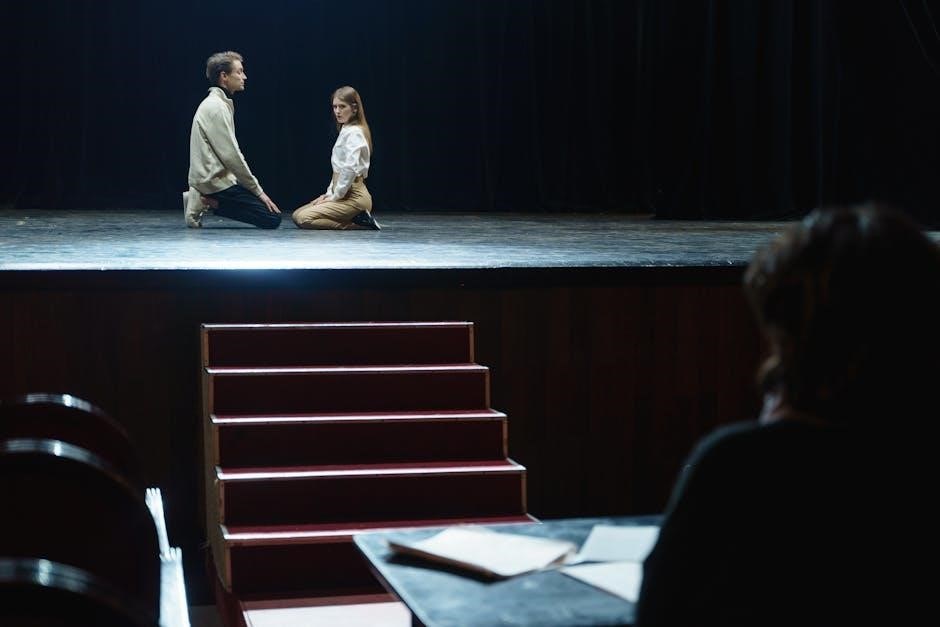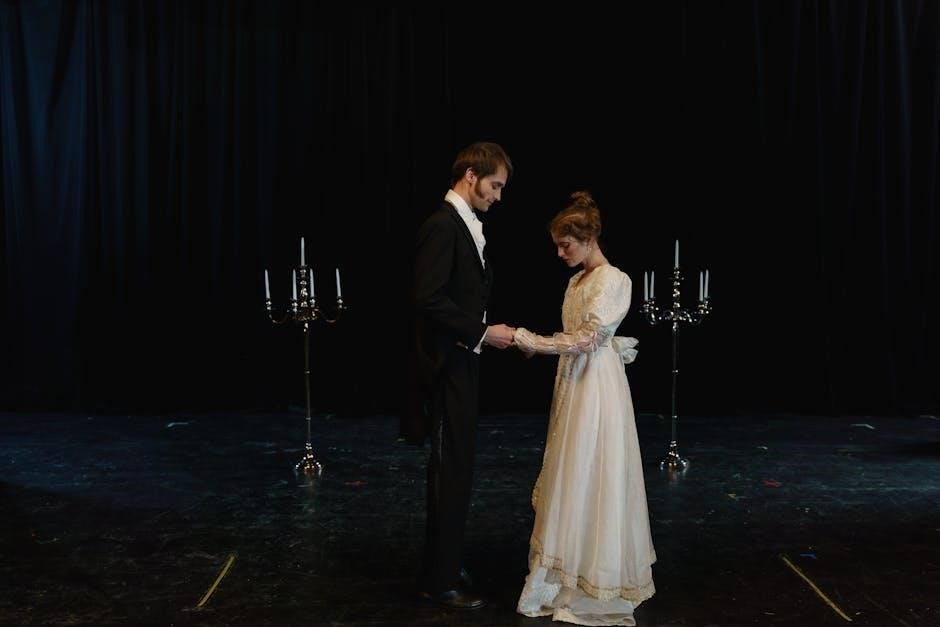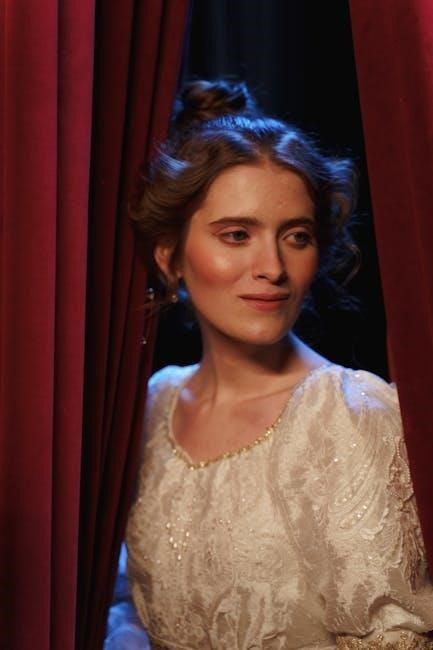Act 1 of Macbeth sets the stage for tragedy, introducing the Three Witches, their prophecies, and the emergence of Macbeth’s ambition amidst a tumultuous Scotland.
1.1 Overview of Act 1
Act 1 of Macbeth introduces the play’s dark and intense narrative, setting the stage for tragedy. The act begins with the Three Witches prophesying Macbeth’s future, creating an eerie and mysterious atmosphere. Macbeth, a noble Scottish general, is introduced as a brave warrior, but his ambition is sparked by the witches’ predictions. The act also establishes key themes, such as the clash between loyalty and ambition, and the blurred lines between appearance and reality. These elements collectively foreshadow the devastating events that will unfold.
1.2 Setting the Stage for Tragedy
Act 1 of Macbeth masterfully establishes a foreboding and ominous tone, laying the groundwork for impending tragedy. The opening storm and the witches’ eerie prophecies create an atmosphere of uncertainty, while their paradoxical language (“fair is foul, and foul is fair”) reflects the moral ambiguity that drives the play. The introduction of Macbeth as a respected warrior contrasts with the seeds of ambition planted by the witches, setting in motion a chain of events that will unravel into chaos and destruction. This duality of honor and darkness foreshadows the tragic downfall that awaits.

The Three Witches and Their Prophecies
The Three Witches, with their enigmatic and cryptic dialogue, introduce the central prophecies that ignite Macbeth’s ambition and set the play’s dark, mysterious tone.
2.1 The Weird Sisters’ Meeting
The Weird Sisters gather on a desolate heath amidst thunder and lightning, creating an eerie atmosphere. Their chants and rhymes, filled with paradox, set the tone for the tragedy. They agree to meet again after the battle to encounter Macbeth, hinting at the dark events to unfold. Their mysterious dialogue, such as “fair is foul, and foul is fair,” establishes the theme of ambiguity and deception. This opening scene introduces the supernatural elements and foreshadows the prophecies that will drive Macbeth’s ambition and the ensuing chaos.
2.2 Paradox and Equivocation in Their Dialogue

The witches’ dialogue is rich in paradox and equivocation, creating an atmosphere of ambiguity. Phrases like “When the battle’s lost and won” and “fair is foul, and foul is fair” blur the lines between truth and deception. Their words are intentionally vague, allowing multiple interpretations and setting the stage for Macbeth’s confusion and ambition. This linguistic trickery emphasizes the supernatural nature of their prophecies, making their predictions both intriguing and unsettling, which deeply influences Macbeth’s future actions and decisions.
2.3 The Prophecy of Macbeth’s Future
The witches prophesied that Macbeth would become the Thane of Cawdor and eventually the King of Scotland. This prediction, combined with the declaration that Banquo’s descendants would reign, ignited Macbeth’s ambition and sparked his desire for power. The prophecies were shrouded in ambiguity, leaving room for interpretation and manipulation. This encounter on the heath marked the beginning of Macbeth’s tragic downfall, as the seeds of ambition were sown, setting the stage for the events that would unfold.

Macbeth and Banquo’s Encounter with the Witches
Macbeth and Banquo, weary from battle, encounter the witches on a stormy heath. The witches’ prophecies ignite Macbeth’s ambition, while Banquo remains cautious, foreseeing potential peril.
3.1 The Battle-Weary Generals
Macbeth and Banquo, seasoned generals, arrive on the heath exhausted from battle. Their victory over the rebels underscores their valor, but the weariness of war is evident. The captain’s praise highlights Macbeth’s bravery, describing his relentless fight against Macdonald and the Norwegian forces. Their physical and mental fatigue contrasts with the eerie atmosphere of the heath, setting the stage for their encounter with the witches. The scene emphasizes their military prowess while hinting at the darkness that awaits them.
3.2 The Witches’ Prophecies and Their Impact
The witches’ prophecies ignite Macbeth’s ambition and Banquo’s curiosity. Foretelling Macbeth’s rise to Thane of Cawdor and eventual kingship, the prophecies create a sense of inevitability. Macbeth, though skeptical, is deeply disturbed, envisioning the throne. Banquo, wary of the witches’ words, questions their credibility but remains uneasy. The prophecies plant seeds of ambition and doubt, setting the tone for the tragic events to unfold. Their impact is immediate, reshaping Macbeth’s perception of his destiny and fueling his desire for power.

King Duncan’s Relationship with Macbeth

King Duncan recognizes Macbeth’s bravery, awarding him the title of Thane of Cawdor. Duncan’s trust and appreciation for Macbeth highlight their strong, respectful relationship, though tensions simmer beneath.
4.1 Duncan’s Recognition of Macbeth’s Valor
King Duncan acknowledges Macbeth’s exceptional bravery in battle, rewarding him with the title of Thane of Cawdor. This recognition underscores Duncan’s trust and admiration for Macbeth, who has proven himself as a loyal and formidable warrior. The king’s gesture not only elevates Macbeth’s status but also strengthens their bond, showcasing Duncan’s appreciation for valor and loyalty. However, this recognition inadvertently fuels Macbeth’s ambition, as the prophecy and newfound honor spark desires that will soon lead to tragic consequences.
4.2 The Significance of the Thane of Cawdor Title
The title of Thane of Cawdor holds profound significance as a reward and a prophecy. Duncan bestows it upon Macbeth, symbolizing his trust and gratitude. Historically, the title was tied to treason, as the previous Thane betrayed Scotland. The witches’ prophecy aligns with Duncan’s decision, reinforcing its importance. This title becomes a catalyst for Macbeth’s ambition, linking his fate to the crown. It signifies honor, power, and the seeds of future turmoil, marking a pivotal moment in Macbeth’s transformation from loyal general to aspiring king.

Lady Macbeth is introduced as a strong-willed and ambitious character. She recognizes Macbeth’s potential and her own desire for power, setting the stage for her influence over him to seize the crown.
5.1 Lady Macbeth’s Reaction to the Prophecy
Lady Macbeth, upon reading her husband’s letter detailing the witches’ prophecy, reacts with a mix of excitement and concern. She recognizes Macbeth’s potential for greatness but fears his hesitation and kindness may hinder their rise to power. Her ambition is ignited, and she resolves to push Macbeth toward seizing the crown, revealing her own ruthless determination and desire for power.

5.2 Her Influence on Macbeth’s Decision-Making
Lady Macbeth exerts significant influence over Macbeth, manipulating his emotions and resolve. She challenges his manhood and questions his courage, goading him into action. Her persuasive techniques, such as questioning whether he truly desires the crown, weaken Macbeth’s moral resistance. Together, they devise a plan to murder King Duncan, with Lady Macbeth’s cunning and determination overshadowing Macbeth’s hesitation. Her role as a catalyst for his dark ambitions underscores her powerful impact on his decision-making process.

The Rising Action Leading to Duncan’s Murder
The witches’ prophecies, Lady Macbeth’s persuasion, and Macbeth’s internal conflict escalate tensions, driving him toward the tragic decision to murder King Duncan.
6.1 Macbeth’s Internal Conflict
Macbeth grapples with a profound internal struggle, torn between his loyalty to King Duncan and his ambition to seize the throne. The witches’ prophecies ignite his desire for power, yet his conscience rebels against the immorality of murder. This psychological battle intensifies as Lady Macbeth goads him, challenging his manhood and resolve. Macbeth’s internal turmoil is evident in his soliloquies, where he debates the consequences of his actions, revealing a man caught between his nobility and the lure of darkness.
6.2 Lady Macbeth’s Persuasion Techniques
Lady Macbeth employs compelling persuasion techniques to influence Macbeth, challenging his manhood and questioning his courage when he hesitates. She uses emotional manipulation, logical arguments, and vivid imagery to push him toward committing the murder. By belittling his fears and reinforcing the potential glory, she strengthens his resolve. Her persuasive tactics reveal her cunning nature and her ability to exploit Macbeth’s vulnerabilities, ultimately driving him to act despite his internal doubts and moral reservations.

Themes and Motifs in Act 1
Act 1 introduces themes of ambition and appearance vs. reality, as the witches’ prophecies spark Macbeth’s desire for power, blurring moral boundaries and illusion with truth.
7.1 The Theme of Ambition
Ambition emerges as a central theme in Act 1, driven by the witches’ prophecies and Lady Macbeth’s cunning manipulation. Macbeth’s desire for power ignites, transforming his noble nature into a relentless pursuit of the crown. Lady Macbeth, equally ambitious, goads him into action, revealing her own ruthless determination. The theme highlights how ambition can distort morality, as both characters begin to prioritize power over ethics. Shakespeare portrays ambition as a double-edged sword, spurring greatness but also leading to tragic consequences when unchecked by conscience or reason.
7.2 The Motif of Appearance vs. Reality
Act 1 introduces the motif of appearance vs. reality, as characters and events mask their true nature. The witches’ paradoxical language blurs truth and illusion, while Macbeth and Lady Macbeth hide their ambitions behind loyal exteriors. King Duncan, unaware of the traitorous Thane of Cawdor, symbolizes the disconnect between appearance and reality. This motif underscores the deceptive nature of truth, as characters navigate a world where nothing is as it seems, foreshadowing the tragic events that will unfold.
Act 1 of Macbeth introduces key characters, themes, and conflicts. The Three Witches prophesize Macbeth’s future, igniting his ambition. King Duncan praises Macbeth’s valor, while Lady Macbeth’s determination emerges, setting the stage for tragedy.
8.1 Key Events and Their Implications
The Three Witches prophesize Macbeth’s future, sparking his ambition. Macbeth and Banquo encounter the witches, learning of their destinies. King Duncan honors Macbeth as Thane of Cawdor, fueling his desire for power. Lady Macbeth, upon hearing of the prophecy, goads Macbeth into plotting Duncan’s murder. These events establish themes of ambition and appearance vs. reality, setting the stage for tragedy. Each event escalates tension, revealing character motivations and foreshadowing the dark consequences of their actions.
